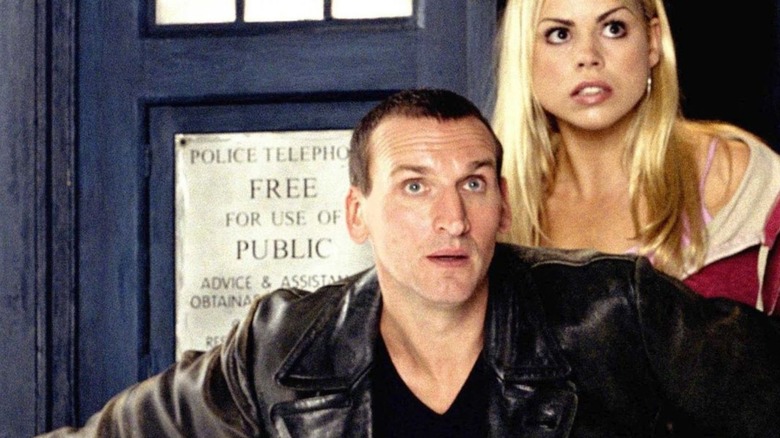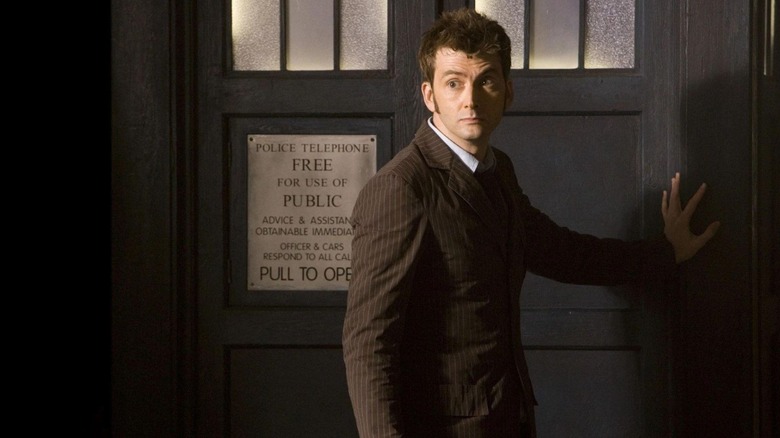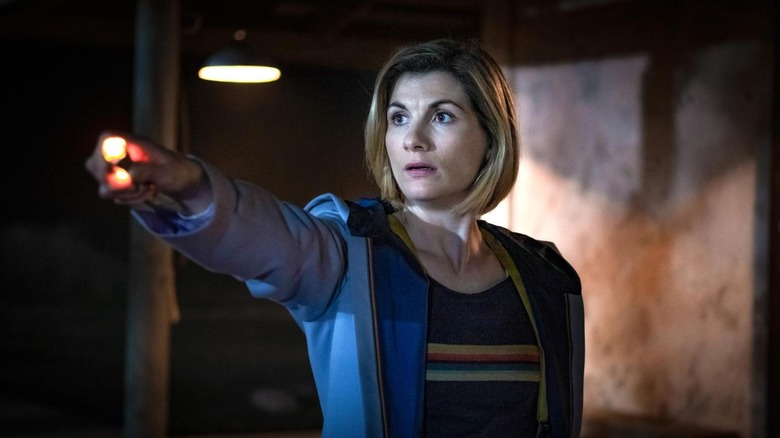Russell T. Davies Had 'Massive Doubts' About Working On Doctor Who
Every modern-day Whovian knows Russell T. Davies was instrumental in helping revive "Doctor Who" after its 16-year hiatus in 2005. The BBC sci-fi series made a memorable return to television with Christopher Eccleston leading the series as the ninth incarnation of the Time Lord. It was an incredible moment for fans who had been denied new episodes for years, and it helped that "Doctor Who" had been reinvented for an entirely new audience. While the show's essence remained, its lore had been revisited, and the show now used its sci-fi elements to assess the human race. With "Doctor Who" reinvented for a global audience — not just a British one — showrunner Russell T. Davies and executive producer Julie Gardner's rendition of the beloved tale was met with riotous applause. The show saw a huge surge in popularity ... and the rest is history.
"Doctor Who" always had a recipe for success: a quirky father-figure in the lead, otherworldly aliens, and the exploration of time travel allowed for compelling storylines. The show's original run lasted 26 years. It was already a landmark of British popular culture, and to revive it in 2005 after its cancellation in 1989 was no easy feat. So it's no surprise Russell T. Davies had "massive doubts" about working on the show back then.
Russell T. Davies had 'very strong doubts'
Russell T. Davies once said that being on the writing roster for "Doctor Who" was one of the most challenging jobs in television. The show is led by a fictional hyper-intelligent Time Lord, has been running for decades, and has been reinventing itself ever since it saw the light of day. Davies had a big hand in bringing us "Doctor Who" as we know it today, but he too had his share of doubts about taking the showrunner position. There were far too many variables: he had a stellar, successful career as a freelance screenwriter and television producer, and the failed "Doctor Who" 1996 film hadn't done much to restore the show's reputation. Davies was also concerned about the creative changes and control he'd have to cede to the BBC. If he were to join the company, it would be an irreversible change in his independent career.
Davies was also doubtful about working within the BBC because he'd heard whispers of the restrictions that came with the job. All of his worries faded away after Julie Gardner, his former collaborator on "Casanova," telephoned him, informing him that they'd be working on the "Doctor Who" revival together.
In an interview published in the June 2020 issue of Doctor Who Magazine, Davies recounted how he decided to take the job in an interview with Steven Moffat. And it was all because of Julie Gardner.
"It was Julie. When Julie Gardner was made Head of Drama at BBC Wales. Before that, I'd had very strong doubts. It's hard to understand from outside the industry, but for a freelancer to go from the independent sector to in-house BBC is unheard of. And let's be honest, for very successful freelancers, like you, me and Chris Chibnall... never! "
'It's a career in reverse'
As a longtime fan of the sci-series, Russell T. Davies was always interested in reviving "Doctor Who," he just needed the right partner to do it with. The screenwriter further explained how the transition from the independent sector to in-house BBC felt like "a career in reverse," but he knew he wanted the showrunner job the moment Julie Gardner stepped in.
"I've been trying to think of another show where that happens. It's just not done. It means ceding control and authorship and copyright to a higher power. It's a career in reverse. And I had massive doubts about working within the BBC, because everyone said it was full of censorship, restrictions and red tape. But then I was on holiday in France in 2003, and Julie phoned me up to say she'd got the BBC Wales job. She told me: "Jane Tranter [Controller of Drama Commissioning] said I could have Doctor Who and we'd make it in Wales." And that was it. Click. I'm in. Away from London, with Julie. Perfect. I knew she could handle the BBC side of it. And I was right – within months, she understood that arcane stuff like procurement rules and what qualifies as a substantive post. Another language! Without her, it's 50-50 whether I'd have taken the job."
Russell T. Davies and Julie Gardner resurrected "Doctor Who" in 2005 — the series has since seen explosive popularity and dominated pop culture conversation over the years. Although he stepped down from the job in 2009, Davies will return to the helm as showrunner to celebrate the show's 60th anniversary in 2023 and the next few seasons to come.


